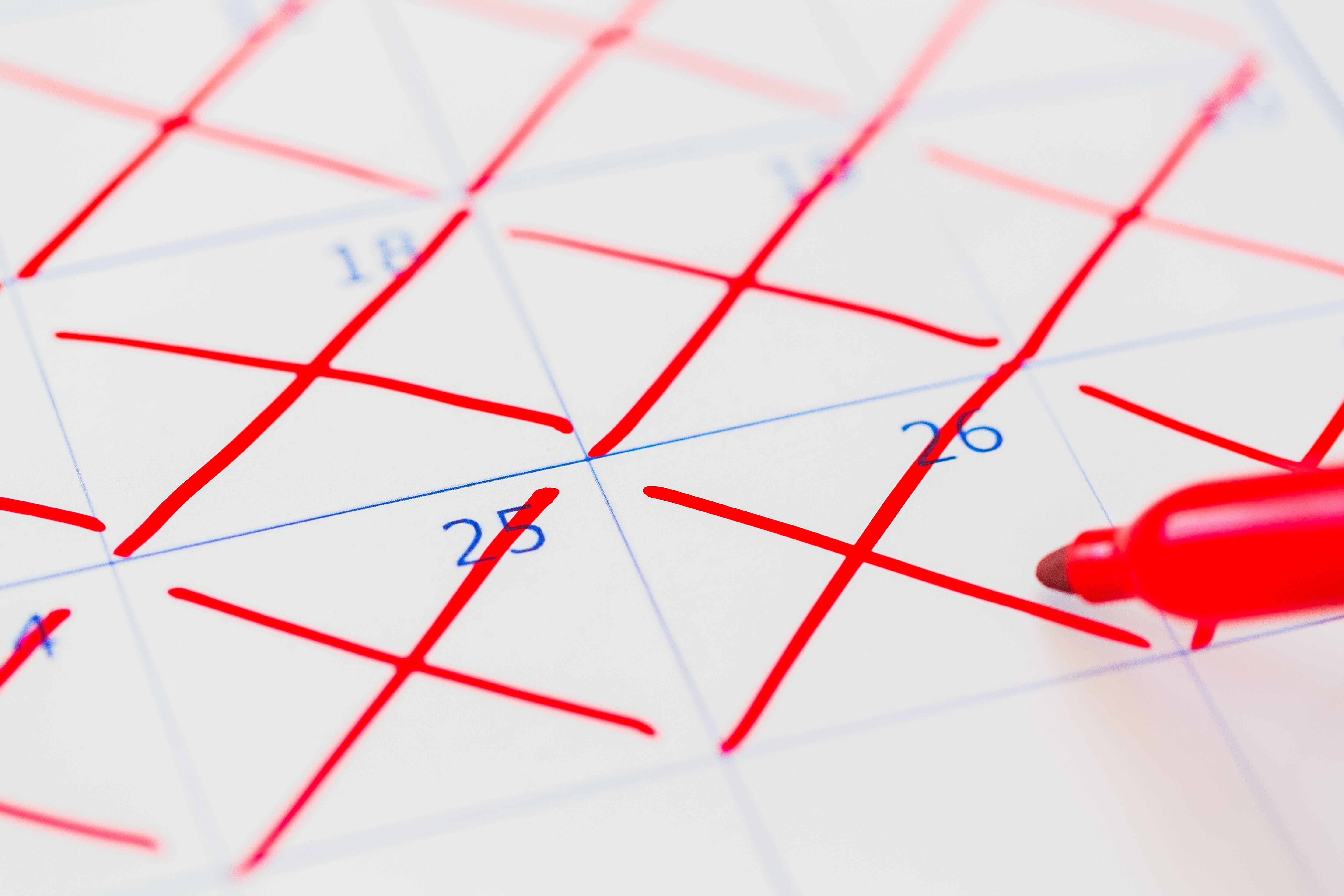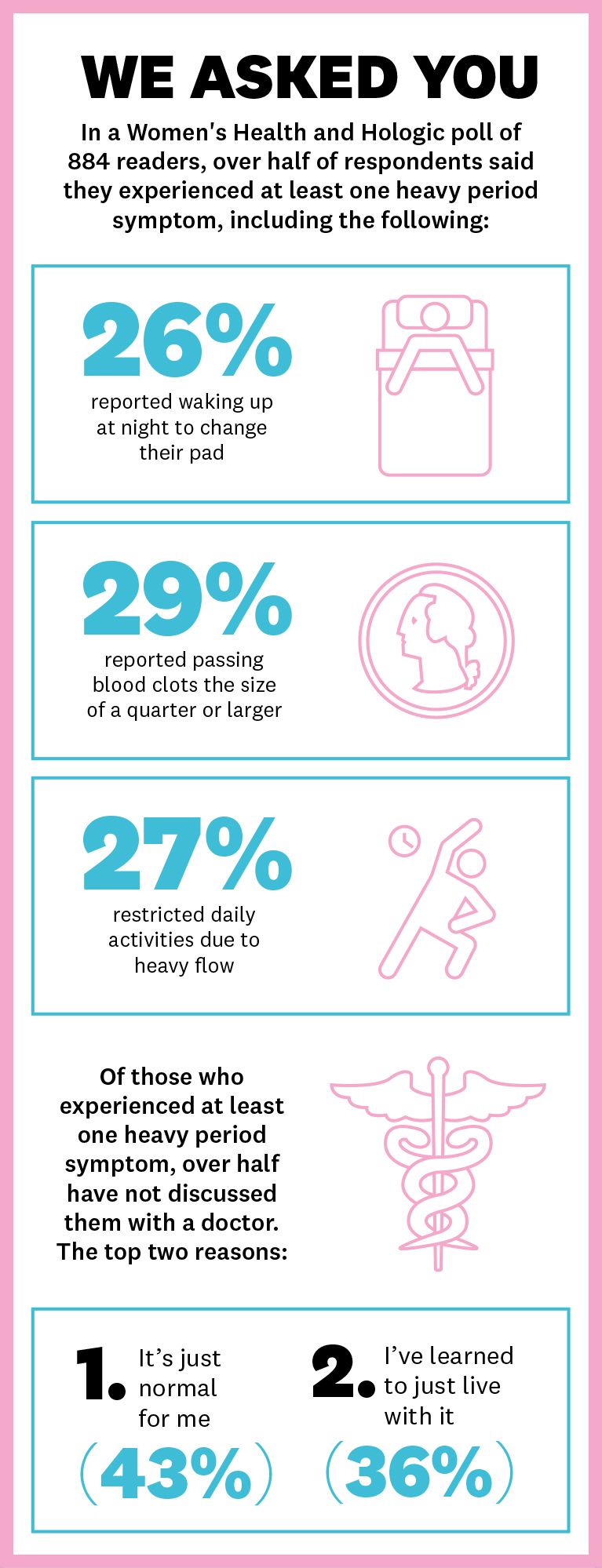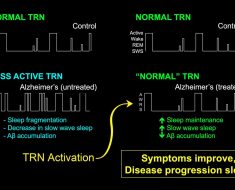Most women have a day or two of heavier bleeding during their periods. But if you’re constantly running to the bathroom to change your tampon, things may not be business as usual. Sure, it might seem easier to ignore your heavy flow and just stock up on super tampons. However, that’s def not the right move—even though that’s what most women say they do.
In a recent poll of 884 Women’s Health readers, a whopping 85 percent of respondents said they thought heavy periods were “just normal.” But here’s the thing: 59% percent of respondents reported experiencing at least one heavy period symptom. What’s more, as many as one in five women might unknowingly have abnormal uterine bleeding (AUB), a health condition marked by long, excessive periods, according to The Centers for Disease Control and Prevention (CDC).
The condition can negatively affect your quality of life, and can also put you at risk for more serious health problems like exhaustion, fatigue, anemia, a weakened immune system, and even decreased fertility, explains Peter D. Weiss, MD, a California-based obstetrician-gynecologist.
Think you may be dealing with AUB? Keep reading. Below, we break down common symptoms and take a look at some treatment options that can help.
1. You’re constantly changing your tampon, pad, or cup, or passing large clots.
 VolanthevistGetty Images
VolanthevistGetty Images
Twenty-six percent of women who took our poll said they have to get up in the middle of the night to switch their pad or tampon, and some have to change their sanitary product more often.
“If you have to use a super tampon every hour or are using a pad as a backup, that tells me a patient is having bleeding that’s outside the realm of normal,” says obstetrician-gynecologist Holly R. Miller, MD.
Another thing to keep an eye out for: blood clots. The occasional small clot isn’t cause for concern, but your bleeding might be excessive if you tend to pass clots that are the size of a quarter or bigger, according to the CDC.
2. Your periods last longer than a week.
 artisteerGetty Images
artisteerGetty Images
Some women with abnormal uterine bleeding have periods that linger for up to 14 days. If that seems like a loooong time, it’s because it is.
A period that lasts longer than seven days is a sign that your period might be heavier than normal, Dr. Miller explains. Def bring this up with your gyno to see if she thinks this could be a sign of AUB.
3. You’re straight up exhausted when you have your period.
 fongleon356Getty Images
fongleon356Getty Images
If your periods tend to be heavy or last for more than seven days, you could develop iron deficiency anemia, a condition that occurs when you have too little iron in your body, according to the CDC. (Iron is found in the blood, so heavy or prolonged bleeding can up the risk for anemia.)
Having anemia can zap your energy, leave you feeling weak, and cause shortness of breath, according to the U.S. Department of Health & Human Services. And the condition is more common than you might think: One in four survey respondents reported dealing with symptoms of anemia. If you think you might be dealing with the condition or AUB play it safe and make an appointment with your doctor.
4. Your period impacts your routine.
 Hero ImagesGetty Images
Hero ImagesGetty Images
More than a quarter of women who took our survey said they cut back on their usual activities because of their heavy periods.
“Some of my patients will describe having to stay home during their periods because they can’t get to the bathroom quick enough,” Dr. Miller says. If you’re skipping work or school or turning down social invitations, your heavy period might be cause for concern.
OMG, this sounds like me. What can I do about it?
Among women that we polled who’ve experienced heavy period symptoms, more than half have never brought it up with their doctor. But you should. (Not quite sure how to get the conversation started? These tips can help.)
Not only can she make sure nothing serious is going on with your health, but your doctor can also offer solutions for AUB. Here are three options she might suggest.
Endometrial ablation: This is a minimally invasive procedure in which a doctor removes the lining of the uterus to control or eliminate menstrual bleeding. Endometrial ablation is only recommended for women who are finished having children, as pregnancy following this procedure can be dangerous. (Learn more about it here.)
The pill and intrauterine devices (IUDs): These impact your menstrual cycle and lessen the amount of bleeding, according to the Institute for Quality and Efficiency in Health Care.
Hysterectomy: This is a major surgery that involves completely removing the uterus. Pregnancy is no longer possible after a hysterectomy.
Want to learn more about our heavy period survey?
Here’s are some of the most interesting takeaways.
 JESSE MUMFORD
JESSE MUMFORD
To learn more about heavy periods and what you can do about them, check out WeHateHeavyPeriods.com.
Source: Read Full Article





